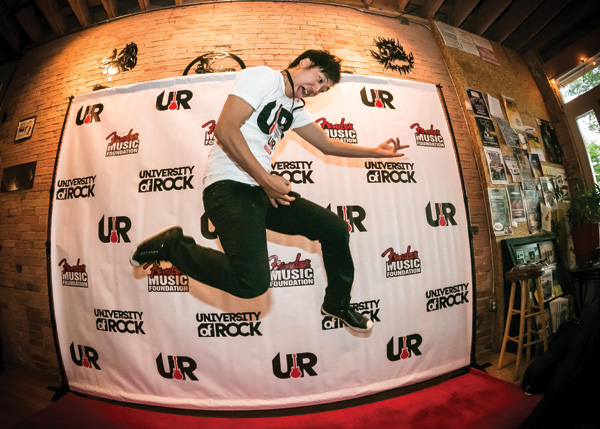by STEVE HAN | @steve_han
editor@charactermedia.com
There were plenty of signs that Jon Kim’s financial situation was pretty dire. One of the more embarrassing ones was when he stood at the counter at a Hollywood In-N-Out Burger, handed the cashier two debit cards, along with two one-dollar bills, and still came up short paying for his Animal-Style cheeseburger, fries and Coke. A stranger standing behind Kim in the long line felt so bad for the then-21-year-old, that he offered to pay the difference.
“Being broke sucks,” says Kim, now 27, as he reflected on one of those embarrassing but wake-up moments from six years earlier. “I had so much pain by not having money. It just fueled me to make my life work.”
For Kim, that meant going from being a struggling musician unable to pay for a single fast food order to founding and running the University of Rock, a burgeoning business that has successfully married his passion for rock’n’roll with his entrepreneurial leanings.
In 2009, with very little capital and working out of his Los Angeles apartment, Kim started the unconventional youth-oriented music school that specializes in rock’n’roll performance. The school prides itself on hiring a dedicated corps of “hip” instructors, often members of rock bands themselves, who provide one-on-one private lessons to youth gravitating more toward the Beatles than to Bach. Because there is no physical campus, the instructors go to the students’ homes or teach via Skype, with lessons offered in guitar, bass, drums, keyboard and vocals to students aged 5 to 18.
Though Kim has spent very little on marketing and advertising for UROCK, as he calls it for short, the young entrepreneur has managed in six years to expand the school’s reach from Los Angeles to nine other West Coast cities in California, Arizona and Colorado, where Kim currently resides.
One big draw is the UROCK pledge that students will learn “faster than they would at other schools,” says Kim, noting that the curriculum is tailored to each individual. He says he has been meticulous in recruiting strong instructors through rigorous interviewing and training, and hiring people not based on musical talent alone.
“This is ultimately a relationship business,” says Kim. “Obviously, our employees have to be talented in terms of their teaching and playing abilities, but are they good role models? Are they fun to be around? I started this business to provide these kinds of teachers to students.”
In many ways, Kim is trying to provide the sort of music teacher he wanted when he was growing up in the suburban Colorado town of Arvada, listening to bands like Green Day and Blink-182. He started taking guitar lessons at age 13—“that’s when I started developing a real passion for it,” he says.
But he went through four different guitar teachers. “I quit on three of them,” he says. “I quit on them because they weren’t into the same music as I was, and they just didn’t have a structured way of teaching.”
In his case, however, the fourth time was the charm. He calls this teacher a musical and personal mentor, someone genuinely interested in his progress as a musician. “I realized that having a teacher who actually cares about what the student wants makes the biggest difference … [and] makes the student feel like he’s actually being supported,” he says.
Kim became so serious about pursuing a career in music that, when he turned 21, he dropped out of the University of Northern Colorado and moved to L.A. so that he could attend Musicians Institute, a guitar performance school based in Hollywood. He clearly showed talent, and he even did some songwriting for TV shows, including Jersey Shore and other MTV programs. But he soon realized that, with all the changes to the music industry, including the growing practice of illegally downloading music, it was becoming much more difficult to make a living in the industry.
“That’s when I just saw the niche in the music school market because a lot of people still had a passion for learning music,” says Kim, who had entertained the idea of one day starting his own business ever since reading Tony Robbins’ Awaken The Giant Within when he was a teenager. “I figured I can turn this into a big thing if I do it right.”
When students first enroll at the University of Rock, within days, they receive what Kim calls a “Rockstarter Kit,” a box that includes a 65-page tutorial book on guitar, bass, drums, piano and vocals. The school also offers a free 30-minute lesson for students, available both in person and online. Kim says the enrollment rate among students who take the trial lesson is over 90 percent. Testimonials on the school’s site—such as the one from Joseph D., who dubbed UROCK the “coolest music school on the planet” after six months of lessons—only help its case.
The business model is pretty straightforward. The students pay fees for lessons, and Kim negotiates a cut with the teachers. Because of lower overhead since there is no physical location for the school, UROCK is able to keep lesson fees competitive, according to Kim. Its main competitor is School of Rock, which has a physical campus in Southern California’s South Bay area. That’s one of the main reasons Kim emphasizes in-home and online lessons, saying that his is a “lifestyle-oriented business” that caters to busy parents and students.
“UROCK doesn’t teach out of a textbook,” says Evan Morgan Jones, who started teaching electric guitar for the school more than two years ago. “We, the teachers, provide specialized lessons based on the students’ interests and their idols. This keeps the excitement of learning at the forefront. UROCK teachers oftentimes become good friends, role models and even the status of local celebrity, which all works to [promote] confidence and learning for the student.”
Jones, who plays in a rock band and also runs a music video production company, notes that other music schools he’s encountered are driven by “rental studios that are motivated by money.” He adds, “UROCK teachers are there for the students.”
Though Kim used to teach guitar at UROCK, he stopped about two years ago, so that he could focus on running and expanding the school, which he says now generates six figures annually in total revenue. He plans to relocate from Denver to New York City in August, as he leads UROCK’s planned expansion to the East Coast.
“When I started, I had no money,” says a reflective Kim, who in recent years has been invited to talk to college audiences about his successful business venture. “I just started thinking of ways to stand out. I literally began by making Craigslist ads and figuring out a way to … make people remember our service. And I did things in a way to make people realize that [our business is] something really credible.
“The reason I started University of Rock came from my experience when I was 13,” he continued. “The best type of response we get are from parents who say how much music has positively affected their children’s lives, from how they’ve become more confident around their friends and family, to how their practice schedule has taught them how to be disciplined in other areas of their lives. … This is really the higher purpose in what we do.”
___
This article was published in the February/March 2015 issue of KoreAm. Subscribe today! To purchase a single issue copy of the February/March issue, click the “Buy Now” button below. (U.S. customers only. Expect delivery in 5-7 business days).









